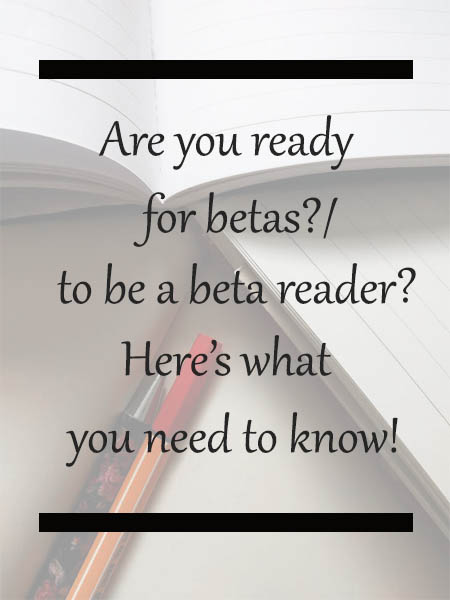
Last week I finished the beta edit for Rise of the Sparrows. Since this will be my first book I hadn’t done the beta reading thing before, and it’s been an interesting experience.
So interesting, in fact, that I thought it might be helpful for other writers in the same situation if I put together a post on everything it’s taught me, as well as a couple of things to consider. Before I asked for beta readers I searched the web for info and it helped a lot, and I’m hoping that my post will add to the helpfulness 🙂
1) Be open to all feedback. Your beta readers will be critical. And you want them to be critical and point out every flaw they can find, because that’s the point of this, right? If you only want to hear that your book is the best book ever, don’t bother asking for betas. It’s not their job to flatter you. It’s their job to find problems so you can fix them before you release your novel into the world, because, trust me, reviewers will find them otherwise.
Hearing that something doesn’t work can be hard. Honestly, I know how much it can sting. However, you ask betas to go over your book baby so they can find any errors, big or small, before you publish your book. I had a lot of feedback, and it improved my novel by so much I can’t put it into words. (And I kinda know a lot of words, so.)
2) Not every suggestion has to be applied. I ended up with so many comments (nearly 30 pages worth) that it got difficult to know what to use and what to leave as it was.
This is inevitable, and you need to decide what needs to be changed and what doesn’t. Spelling errors, inconsistencies, or punctuation mistakes aren’t up for discussion. You change them. Style problems are a little harder, because this is where opinions play a huge part. If, say, out of ten betas only two didn’t like Chapter 10 then you don’t necessarily need to change it. The other 8 liked it, or at least didn’t dislike it, but if you’re not sure what to do you can always ask your other betas. They won’t mind, it’s what they’re there for!
Which brings me to the next point:
3) It’s okay to ask for clarification. I did this so often towards the end my betas probably don’t want to see my name pop up in their inbox ever again. (Tough, I’ll be back next year.)
Not all of your betas will have done this before, and those new to this process may not be great at giving feedback. Giving constructive feedback is a skill like any other. So, if you don’t understand what they mean by one of their points, ask them!
Equally, one of my betas was very critical, which is great and helped a lot, but when only one beta feels very strongly about a specific scene you can ask the others for their opinions. For example, if one of your betas says that Chapter 10 is the worst thing ever but none of your other betas has flagged it up, ask them what they thought of it. If most of them feel the same way, change it. If they say that they loved it, keep it as it is. Remember point 2 – not every suggestions has to be applied!
Which brings me to this:
4) It needs to be a partnership – The betas don’t just go over your draft, hand it back with some comments, and then that’s it. You need to work together to get the most out of it.
You as the writer don’t get to be defensive, and you as the reader don’t get to make demands.
If you’re the writer – Your readers already know how you feel about that one section – you’ve written it, after all. It’s true that you don’t have to apply every change they suggest, but if you don’t change something make sure it’s for a good reason, not just because your ego gets in the way. Your betas do this to help you, so don’t get defensive or upset when they make suggestions. I know it can hurt when they find flaws with that one scene you’re really proud of, but that’s what you need them to do. If you only want the flattery and find yourself making excuses for every point they flag up, you’re not ready for this.
If you’re the beta – Think about how you sound in your emails. It’s easy to sound very pushy, or even demanding, and chances are you don’t mean to. You don’t need to lick the writer’s boots – they want your criticism – but you can deliver your feedback without being rude. There’s no need for it, and it takes no effort to word your criticism a little more nicely. The writer will get the point, I promise.
One of my betas apologised after finishing because she was worried that she had been too harsh, and she didn’t want to sound too critical. In fact she’d been lovely, but a lot of writers can get very defensive. Another reader asked me if I’d get mad if she pointed out mistakes before she even started. If you don’t want to hear it, don’t ask for it. It spoils the experience for your betas and you don’t get anything out of it. I know I’v said this before, but I’ll say it again so it sinks in: Your betas aren’t there to flatter you. You want them to find the mistakes and the scenes that don’t work. Don’t feel like you’ve done badly or like you’re not cut out to be a writer because they come back with a lot of suggestions! Thank them, and –
5) Be grateful. Your betas are unpaid, and therefore they are doing you a HUGE favour. I owe all of them a coffee/tea/hot chocolate/strong vodka, and I’ll be thanking all of them by name in the acknowledgements in the book. It’s the least I can do, and if I ever meet any of them in person they will get chocolates and hugs from me. Having been a beta myself a couple of times now I can tell you first hand how time consuming it can be!
6) Best friends are not good choices. Especially your best friend who reads all the time. I knew this going in, but I asked some of my real-life friends to do it, anyway. I wanted to see how their feedback compared to the feedback from people who don’t feel like they have a moral obligation to be nice to me.
Long story short, it didn’t work out – but not because they were too biased. It didn’t work because, unlike my other betas, none of them made the time to read it! Well, none of them save one. (THANK YOU, SARAH!!)
Your best friends should only do this if they can be honest with you, and aren’t going to sugar coat things because you’ve known each other since kindergarten. Even then I strongly recommend you get some other people involved. Strength in numbers, and all that.
7) Know your limits – don’t volunteer if you have exams in two weeks. Chances are you’ll need to study and won’t have time. That’s fine, don’t worry about it! There’ll always be the sequel. If you volunteer despite not having the time you’ll only end up apologising and explaining why you can’t do it after all, and if you’re like me you’ll feel all shades of guilty about it, too. If it’s a busy time of year for you don’t make it harder on yourself by adding something else to your list of chores.
8) Set a deadline, and remember to leave room for yourself to edit after the process is over. I was very clear on this when we started – I wanted my betas to give me feedback as they were reading, so that I could make changes immediately, rather than apply all of the changes at the end of their four weeks. This has saved me a lot of time, and it still got stressful during the last four days.
Set yourself enough time to finish the edit afterwards, and you won’t have any stress! Or not as much, at least. When the sequel to Rise of the Sparrows is ready for betas I’ll leave myself an entire week after the beta read is over, to avoid the stress I had this time. I might not need that extra week, but if I do I’ll have it planned into my schedule.
9) There is no correct amount of betas. When I first sent out the call I figured I’d go with five to seven people. I ended up with fourteen. I did worry that I had too many – there is so much different feedback coming in it’s hard to know what to change and what to keep – but I think I had a good amount there. Most of them found things the others didn’t spot, and they all added something to my thirty pages of feedback. All of them were helpful. Having said that not all of them read it, either because they had no time after all (see point 7) or because exams got in the way and they dropped out, so I was closer to ten than I was to fourteen.
Just keep in mind that there’ll be more responses than you realise. I thought I’d go with five, seven if I was lucky enough to have this much interest. I ended up turning people down. Set yourself a number, and stick to it or it’ll get out of hand quickly. They’ll likely be excited to help out, which makes it all the more important to stick to your original goal. It’s not easy turning people down when they are excited to be included, but you can do it. I and my Sellybean believe in you.
10) Don’t rush it. I know how exciting/terrifying it is to have people read over your book baby and point out all of its flaws so you can improve them, but don’t start the beta read until it’s ready. Your betas are there to spot all the mistakes you didn’t find. By the time you involve betas, your draft should already have had two, three, maybe more revisions; that number really depends on you. It’s not ready just because you’ve finished the first draft. As we all know, first drafts are terrible. That’s fine, they’re meant to be. But your betas likely won’t have time to whip a first draft into shape, so edit several times yourself first. When you contact betas, you should be confident that you’ve done everything you can yourself.
11) You want beta readers. This process has definitely had its ups and downs, but I can’t stress enough how valuable my betas have been, or how much they’ve changed my draft for the better. You want betas. Don’t argue with me, just trust me.
Have you been a beta before, or a writer who has worked with betas and want to add something to this list? Do you have any questions about the process, or are you unsure about something? Grab a cookie and let’s chat!
——————————–
GIFs are from giphy
For all of my other musings, click me!
For Cookie Break’s home page, have a look here.




March 15, 2016 at 11:49 am
This is all really helpful- I’m not at the beta stage yet, for a number of reasons (not gonna pontificate about that here, cos it’ll go on too long), but I certainly think this’ll be useful advice for the future. I do have a question though: how do you actually get beta readers? I’ve heard people saying they post it on facebook, but I’m pretty sure that would just cause the problems you get at number 6 would come into play.
LikeLiked by 1 person
March 15, 2016 at 11:56 am
I asked for betas on here 🙂 People were already following my progress so I figured a fair amount of people would see it if I advertised it here. I also posted the update on twitter and my writer-specific facebook page, not on my personal accounts. You don’t have to accept everyone – chances are you’ll get too many requests anyway – so if you don’t think someone would be a good fit you can say no 🙂 There are forums on websites where you can find betas as well, but I haven’t tried any of those so I can’t tell you how good they are. One of my friends went through a site like that and most of her betas dropped out without saying a word half way through, though.
LikeLiked by 2 people
March 15, 2016 at 12:00 pm
Ahh ok, that’s very helpful, thank you very much 🙂 Yeah, I’d imagine it’s better to do it with people you have some connection to, rather than a random forum. Very useful advice, thanks!
LikeLiked by 1 person
March 15, 2016 at 2:36 pm
You’re very welcome, I’m glad I could help 🙂 I don’t think I would have liked to ask a complete stranger from a forum because I have no idea who they are. Of course I don’t know the people who comment on my blog that well, either, but I know they were interested in my writing, and genuinely wanted to help me improve it – which didn’t make them any less critical!
Would it help if I did another post next week on how to find beta readers? 🙂
LikeLike
March 15, 2016 at 3:30 pm
This is excellent and I will be saving this forever!!! I intend to be entering the beta phase very soon and ALL of this is such sage wisdom!! Thank you thank you thank you!!! You’re an angel! ^.^
LikeLike
March 15, 2016 at 4:15 pm
Thank you, I’m glad you found it useful! The beta phase is an interesting stage to be sure, I hope it goes smoothly for you 🙂
LikeLiked by 1 person
March 15, 2016 at 10:25 pm
A great post and an amazing insight into the world of beta reading and the writing perspective as well. Great advice to keep
Hold of. Thank you 🙂
LikeLiked by 1 person
March 16, 2016 at 6:43 pm
Thank you! I hope it will help you should you decide to ask for betas in the future 🙂
LikeLiked by 1 person
March 20, 2016 at 7:51 pm
Great advice shared Sarina 🙂 Thanks for lending insight. Beta reading is something I’m considering at the moment and your tips are just perfect.
I truly enjoyed being a beta reader for you 🙂 It’ll be interesting being on the other side.
LikeLiked by 1 person
March 22, 2016 at 1:53 pm
Thank you, Faith! You’ve made it such an enjoyable experience for me ❤ I'm glad my post will be useful to you. The beta stage has been very interesting for me, I've certainly learned a lot for the next time!
LikeLiked by 1 person
March 21, 2016 at 9:43 pm
This post actually came just in time. I’m looking for beta readers right now and I’ve been looking online as well to see what exactly they do and what I need to keep in mind. Already it’s really stressful and I haven’t even sent anything out yet! Anyway, this post made everything a little less scary and if you don’t mind, I might send it out to my potential betas for reference. 🙂
LikeLiked by 1 person
March 21, 2016 at 10:20 pm
Good timing! I’m glad it was helpful and made the whole process less scary 🙂 I hope you find excellent betas! That’s fine, feel free to link it for them 🙂 a lot of my betas hadn’t done it before so hopefully the information will be useful to yours! 🙂
LikeLiked by 1 person
March 22, 2016 at 1:51 am
Thanks! 🙂
LikeLiked by 1 person
March 24, 2016 at 5:34 am
Where did you find your beta readers?
LikeLiked by 1 person
March 24, 2016 at 9:17 am
I asked on here, my twitter, and my facebook page 🙂 This is the blog post: http://sarinalangerwriter.com/2016/02/10/call-for-beta-readers/
Thank you! 🙂
LikeLiked by 1 person
March 24, 2016 at 12:16 pm
Okay, thank you!
LikeLike
March 24, 2016 at 5:34 am
Great post, btw
LikeLiked by 1 person
March 24, 2016 at 12:22 pm
Reblogged this on Ebby's Lane and commented:
This is a great post for authors seeking Beta Readers!
LikeLiked by 1 person
March 24, 2016 at 1:06 pm
Thank you for reblogging this! ❤ Good luck with the beta read 🙂
LikeLiked by 1 person
March 24, 2016 at 2:01 pm
: )
LikeLike
March 31, 2016 at 5:19 am
This post is super helpful. I tried to gather some beta readers about 18 months ago but it didn’t really work out. My piece wasn’t quite ready yet and only a few people volunteered. Of those, only a couple actually gave me feedback and that was limited to a handful of comments. I’m now almost ready to try it again with a hugely improved manuscript and a much better idea of what I want from the betas. 🙂
LikeLiked by 1 person
March 31, 2016 at 1:14 pm
I’m sorry it didn’t work the first time. One of my writing friends didn’t have much luck on her first try, either, which is a shame. The writing community is so wonderful and helpful, I’m sure your second go will go much better 🙂 Best of luck with everything!
LikeLiked by 1 person
April 2, 2016 at 8:41 am
Thank you 🙂
LikeLike